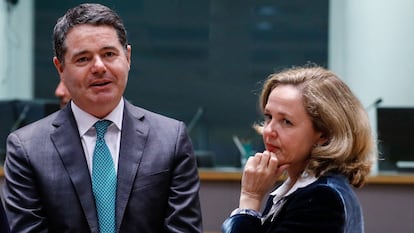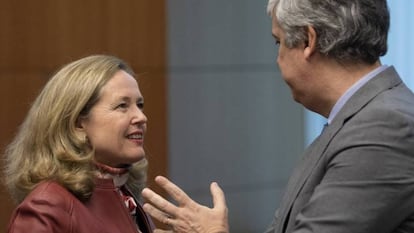Spain’s nominee loses Eurogroup presidency in surprise defeat
Nadia Calviño was backed by Germany, France and Italy, and the reversal weakens the Spanish position ahead of a key summit on an EU coronavirus recovery fund

Despite backing from France, Germany, Italy and several other countries, Spain’s candidate to head the Eurogroup of eurozone finance ministers has lost the race to Ireland’s Paschal Donohoe.
Nadia Calviño went into the vote on Thursday as the lead contender after gaining support from a group of countries representing over 80% of the euro zone’s gross domestic product (GDP). She attracted nine out of the 10 required votes, pushing the contest into a run-off that was won by Donohoe.
“We had secured pledges for 10 votes, but someone did not do what they said they would do,” said Calviño in a Friday interview on the radio station SER. “Had it succeeded, it would have been a very important change. It would have been the first time for a large country [to head the Eurogroup], the first time for a woman...”
The outcome is a diplomatic setback for the Spanish government headed by Pedro Sánchez, of the Socialist Party (PSOE), who had been campaigning for weeks to gain backing for his economy minister.
We had secured pledges for 10 votes, but someone did not do what they said they would doSpanish Economy Minister Nadia Calviño
The decision could have an impact on the upcoming summit on an EU recovery fund to help countries bounce back from the economic effects of the coronavirus pandemic. Spain, one of Europe’s worst-hit countries, supports a distribution of funds where grants play a large role, while some member states are pushing for this money to take the form of loans.
But Calviño played down the notion of a north-south division preventing a unified approach to European recovery. “The possible tensions between north and south are not new, although the lines are not so clear,” she said. “The negotiation is more multifaceted than the North-South axis. I think that what prevails now is the feeling that we are all in the same boat.”
Calviño had come to the vote as a leading candidate who could boast a strong career at the EU, where she once served as director-general of the European Commission’s budget department. Considered politically neutral, over the years she was appointed to economy ministry positions by both conservative and socialist administrations in Spain.
Calviño secured nine out of the 10 necessary votes in the first round, according to diplomatic sources familiar with the matter. Although the vote is secret, her supporters reportedly included Germany, France, Portugal, Italy, Finland, Malta, Greece and Cyprus. There were 19 ministers voting on the successor to the outgoing Mário Centeno of Portugal.

But the EU’s heavyweights were defeated by a group of smaller countries in a reminder that the votes are not weighted according to size or GDP. After the candidate from Luxembourg, Pierre Gramegna, was eliminated, Calviño and Donohoe went to a run-off in which the EU’s small member states rallied behind the Irish candidate.
Diplomatic sources said that Austria and several Eastern European countries voted for Donohoe, as did some member states who had earlier supported Gramegna.
While Ireland – which experienced a bailout during the previous economic crisis – has backed the idea of issuing eurobonds to create a EU recovery fund, Donohoe had met with resistance from France, Germany, Spain and Italy because of his defense of low corporate tax and refusal to tax big tech companies.
The outcome of the vote could play a role in the upcoming summit of July 17-18 to hammer out an agreement on a proposed €750 billion coronavirus recovery fund. The European Commissioner for the Economy, Paolo Gentiloni, warned Donohoe after his win about “the risk of growing divergences” within the euro zone.
Donohoe has pledged to “work very hard with my colleagues so that the Eurogroup can play a very positive role in the recovery fund.” Calviño congratulated the winner and said she hoped to work with him to ensure a strong recovery “that leaves nobody behind.”
In 2018, Calviño once remarked in public that the northern European members who make up what has come to be known as the New Hanseatic League, formed to make up for Britain’s departure from the EU, were “small countries with a small weight.” These words could now be the epitaph of her failed run for the Eurogroup presidency.
English version by Susana Urra.
Tu suscripción se está usando en otro dispositivo
¿Quieres añadir otro usuario a tu suscripción?
Si continúas leyendo en este dispositivo, no se podrá leer en el otro.
FlechaTu suscripción se está usando en otro dispositivo y solo puedes acceder a EL PAÍS desde un dispositivo a la vez.
Si quieres compartir tu cuenta, cambia tu suscripción a la modalidad Premium, así podrás añadir otro usuario. Cada uno accederá con su propia cuenta de email, lo que os permitirá personalizar vuestra experiencia en EL PAÍS.
¿Tienes una suscripción de empresa? Accede aquí para contratar más cuentas.
En el caso de no saber quién está usando tu cuenta, te recomendamos cambiar tu contraseña aquí.
Si decides continuar compartiendo tu cuenta, este mensaje se mostrará en tu dispositivo y en el de la otra persona que está usando tu cuenta de forma indefinida, afectando a tu experiencia de lectura. Puedes consultar aquí los términos y condiciones de la suscripción digital.








































